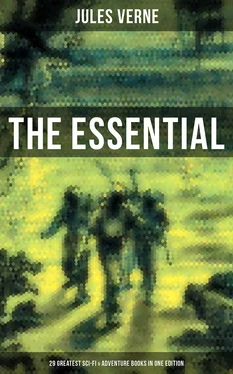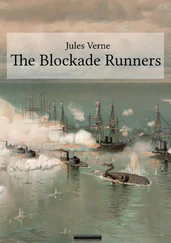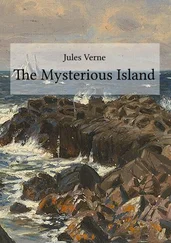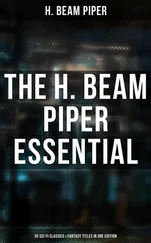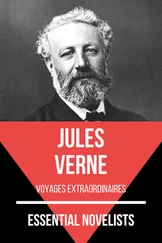It was, therefore, a precious document for the travellers, for they could study the country before setting foot upon it.
They took also three rifles and three fowling-pieces with powder and shot in great quantity.
“We do not know with whom we may have to deal,” said Michel Ardan. “Both men and beasts may be displeased at our visit; we must, therefore, take our precautions.”
The instruments of personal defence were accompanied by pickaxes, spades, saws, and other indispensable tools, without mentioning garments suitable to every temperature, from the cold of the polar regions to the heat of the torrid zone.
Michel Ardan would have liked to take a certain number of animals of different sorts, not male and female of every species, as he did not see the necessity of acclimatising serpents, tigers, alligators, or any other noxious beasts in the moon.
“No,” said he to Barbicane, “but some useful animals, ox or cow, ass or horse, would look well in the landscape and be of great use.”
“I agree with you, my dear Ardan,” answered the president of the Gun Club; “but our projectile is not Noah’s Ark. It differs both in dimensions and object, so let us remain in the bounds of possibility.”
At last after long discussions it was agreed that the travellers should be content to take with them an excellent sporting dog belonging to Nicholl and a vigorous Newfoundland of prodigious strength. Several cases of the most useful seeds were included amongst the indispensable objects. If they had allowed him, Michel Ardan would have taken several sacks of earth to sow them in. Any way he took a dozen little trees, which were carefully enveloped in straw and placed in a corner of the projectile.
Then remained the important question of provisions, for they were obliged to provide against finding the moon absolutely barren. Barbicane managed so well that he took enough for a year. But it must be added, to prevent astonishment, that these provisions consisted of meat and vegetable compressed to their smallest volume by hydraulic pressure, and included a great quantity of nutritive elements; there was not much variety, but it would not do to be too particular in such an expedition. There was also about fifty gallons of brandy and water for two months only, for, according to the latest observations of astronomers, no one doubted the presence of a large quantity of water in the moon. As to provisions, it would have been insane to believe that the inhabitants of the earth would not find food up there. Michel Ardan had no doubt about it. If he had he would not have gone.
“Besides,” said he one day to his friends, “we shall not be completely abandoned by our friends on earth, and they will take care not to forget us.”
“No, certainly,” answered J.T. Maston.
“What do you mean?” asked Nicholl.
“Nothing more simple,” answered Ardan. “Will not our Columbiad be still there? Well, then, every time that the moon is in favourable conditions of zenith, if not of perigee—that is to say, about once a year—could they not send us a projectile loaded with provisions which we should expect by a fixed date?”
“Hurrah!” cried J.T. Maston. “That is not at all a bad idea. Certainly we will not forget you.”
“I depend upon you. Thus you see we shall have news regularly from the globe, and for our part we shall be very awkward if we do not find means to communicate with our good friends on earth.”
These words inspired such confidence that Michel Ardan with his superb assurance would have carried the whole Gun Club with him. What he said seemed simple, elementary, and sure of success, and it would have been sordid attachment to this earth to hesitate to follow the three travellers upon their lunar expedition.
When the different objects were placed in the projectile the water was introduced between the partitions and the gas for lighting purposes laid in. Barbicane took enough chlorate of potash and caustic potash for two months, as he feared unforeseen delay. An extremely ingenious machine working automatically put the elements for good air in motion. The projectile, therefore, was ready, and the only thing left to do was to lower it into the gun, an operation full of perils and difficulty.
The enormous projectile was taken to the summit of Stony Hill. There enormous cranes seized it and held it suspended over the metal well.
This was an anxious moment. If the chains were to break under the enormous weight the fall of such a mass would inevitably ignite the guncotton.
Happily nothing of the sort happened, and a few hours afterwards the projectile-compartment rested on its pyroxyle bed, a veritable fulminating pillow. The only effect of its pressure was to ram the charge of the gun more strongly.
“I have lost,” said the captain, handing the sum of 3,000 dollars to President Barbicane.
Barbicane did not wish to receive this money from his travelling companion, but he was obliged to give way to Nicholl, who wished to fulfil all his engagements before leaving the earth.
“Then,” said Michel Ardan, “there is but one thing I wish for you now, captain.”
“What is that?” asked Nicholl.
“It is that you may lose your other two wagers. By that means we shall be sure not to be stopped on the road.”
Table of Contents
The 1st of December came, the fatal day, for if the projectile did not start that very evening at 10h. 46m. and 40s. p.m., more than eighteen years would elapse before the moon would present the same simultaneous conditions of zenith and perigee.
The weather was magnificent; notwithstanding the approach of winter the sun shone brightly and bathed in its radiance that earth which three of its inhabitants were about to leave for a new world.
How many people slept badly during the night that preceded the ardently-longed-for day! How many breasts were oppressed with the heavy burden of waiting! All hearts beat with anxiety except only the heart of Michel Ardan. This impassible person went and came in his usual business-like way, but nothing in him denoted any unusual preoccupation. His sleep had been peaceful—it was the sleep of Turenne upon a gun-carriage the night before the battle.
From early dawn an innumerable crowd covered the prairie, which extended as far as the eye could reach round Stony Hill. Every quarter of an hour the railroad of Tampa brought fresh sightseers. According to the Tampa Town Observer , five millions of spectators were that day upon Floridian soil.
The greater part of this crowd had been living in tents round the inclosure, and laid the foundations of a town which has since been called “Ardan’s Town.” The ground bristled with huts, cabins, and tents, and these ephemeral habitations sheltered a population numerous enough to rival the largest cities of Europe.
Every nation upon earth was represented; every language was spoken at the same time. It was like the confusion of tongues at the Tower of Babel. There the different classes of American society mixed in absolute equality. Bankers, cultivators, sailors, agents, merchants, cotton-planters, and magistrates elbowed each other with primitive ease. The creoles of Louisiana fraternised with the farmers of Indiana; the gentlemen of Kentucky and Tennessee, the elegant and haughty Virginians, joked with the half-savage trappers of the Lakes and the butchers of Cincinnati. They appeared in broad-brimmed white beavers and Panamas, blue cotton trousers, from the Opelousa manufactories, draped in elegant blouses of écru cloth, in boots of brilliant colours, and extravagant shirt-frills; upon shirt-fronts, cuffs, cravats, on their ten fingers, even in their ears, an assortment of rings, pins, diamonds, chains, buckles, and trinkets, the cost of which equalled the bad taste. Wife, children, servants, in no less rich dress, accompanied, followed, preceded, and surrounded their husbands, fathers, and masters, who resembled the patriarchs amidst their innumerable families.
Читать дальше
